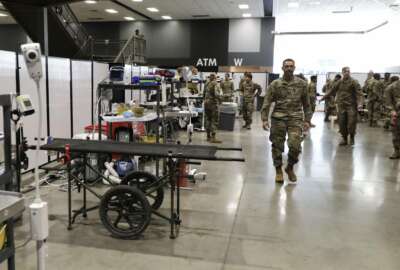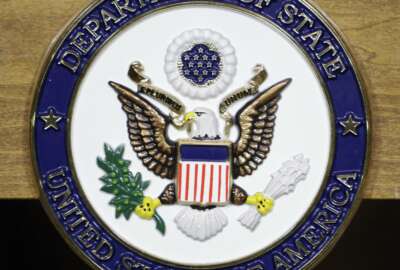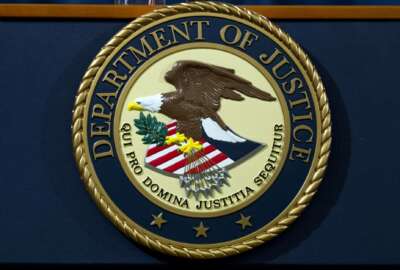
Peace Corps volunteers sent home early due to pandemic will get financial aid from agency
In today's Federal Newscast, Peace Corps Director Jody Olsen says the volunteers will receive a wellness stipend to help cover costs associated with the...
To listen to the Federal Newscast on your phone or mobile device, subscribe in PodcastOne or Apple Podcasts. The best listening experience on desktop can be found using Chrome, Firefox or Safari.
- Peace Corps is giving a one-time stipend to the 7,000 volunteers and trainees who had to come back to the U.S. because of the coronavirus pandemic. Director Jody Olsen announced the $1,500 wellness stipend to help cover costs associated with the evacuations, including health care. The Peace Corps says these funds will be provided in addition to the evacuation and readjustment allowances that were disbursed in recent weeks. Evacuees were also provided with two months of health insurance coverage and the option to purchase a third month of coverage.
- 16 Senators want to send federal technology SWAT teams to rescue state and local governments. In a letter to House and Senate leaders the group asks for $75 million dollars in the next stimulus funding bill, for the U.S. Digital Service and GSA’s Technology Transformation Service’s 18F group to send teams of experts out to help fix state and local IT systems that are struggling to hand out federal aid during the pandemic.
- Agency webinars are breaking out all over, presuming agency servers and networks can support the load. The Federal Energy Regulatory Commission hosts one today to discuss the threats to electricity distribution from workforce and supply chain disruptions. It occurs ahead of the agency’s scheduled summer reliability assessment. And the IRS hosts a webinar open to, pretty much anyone who wants to sign in. No less than commissioner Chuck Rettig and two other officials will answer questions about Cares Act benefits, or anything else having to do with coronavirus.
- Federal employees have another opportunity to donate to the Combined Federal Campaign this year. The Office of Personnel Management launched a special solicitation for the CFC, to give federal employees a chance to donate to one of six-thousand charities supporting coronavirus response. OPM says employees, retirees, military members and Postal workers can donate through the CFC giving portal or the mobile app. OPM has the authority to reopen the CFC under special circumstances for emergencies or disasters. The donation window is open through June 30.
- The Office of Personnel Management has more details on emergency sick leave for federal employees. OPM is out with more guidance on the emergency sick leave Congress passed into law last month. Federal employees have access to 80 extra hours of paid or partially paid sick leave, but only once. They won’t get additional hours if they switch jobs or move to another agency. There is no minimum service requirement to use it, but employees have to meet one of five circumstances. They must also document any use of the emergency paid sick leave, and explain the circumstances they’re using it for.
- Government contractors now have important guidance for how to proceed when they win a new contract or how to leave an agency if they end a contract. This guidance helps answer one of the biggest questions that vendors still have about how the coronavirus pandemic is impacting procurement. The General Services Administration issued an acquisition letter giving contracting officers and vendors instructions for on boarding new industry employees and off boarding those whose contract has ended. The memo addresses everything from building access to government furnished IT to network permissions.
- The Defense Department is starting to proactively test troops for the coronavirus in an attempt to stop the spread of the disease. The Pentagon created a tiered system for testing since supplies are limited. The military plans to test service members who work in critical areas by the end of April. DoD will also quarantine troops about to deploy and may have been exposed to coronavirus for two to three weeks before they can work in close quarters with other people. (Federal News Network)
- Marines can breathe a sigh of relief and have a little more time to get in shape. Marine Corps Commandant Gen. David Berger announces the semi-annual fitness test this spring for marines will be canceled. Berger says he expects marines to stay in top shape to maintain fighting condition though. Berger canceled the fitness test to avoid the spread of coronavirus. The next test will be in the fall.
- The Air Force signs an agreement for what officials say could be a “game changer” for coronavirus testing. The $13 million R&D agreement between the Air Force’s Rapid Capabilities Office and the firm Curative aims to deploy 40,000 test kits to military medical personnel over the next two weeks. The new testing procedure uses saliva samples instead of nasal swabs, and doesn’t need to be administered by medical personnel. In the initial phase, the Air Force will send samples from eight military bases to two consolidated labs, each of which will be able to handle 50,000 samples a day. From there, officials hope to quickly scale the new test to a national level.
- The Justice Department is cracking down on hundreds of online scams linked to the coronavirus. Several of the fraudulent sites were spoofs of the IRS’ stimulus payment website, and set up as part of future phishing schemes. The FBI also cracks down on fake websites aimed at tricking users into entering personally identifiable information and banking details. The FBI’s Internet Crime Complaint Center reports receiving more than 3,600 complaints related to the coronavirus.
- The State Department’s intelligence bureau is doing more work in an unclassified setting. The Bureau of Intelligence and Research is thinking beyond the SCIF, and using more open-source data as the starting point for its intelligence-gathering operations. This allows the bureau to share more of its analysis with diplomats compared to its secret or higher classification intelligence. The bureau is also looking at artificial intelligence and data analytics tools to get even more out of this open data. (Federal News Network)
Copyright © 2025 Federal News Network. All rights reserved. This website is not intended for users located within the European Economic Area.
Eric White
Eric White is news anchor and Federal Drive producer at Federal News Network.
Follow @FEDERALNEWSCAST





